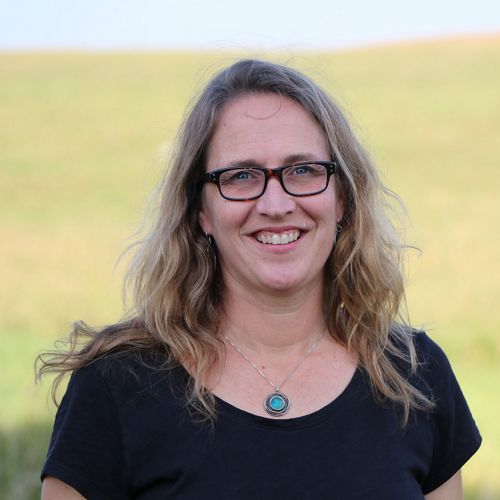Kim Hall
Climate Change Ecologist, North America Science
Michigan, USA

Kimberly Hall Kim Hall, TNC limate change scientist © Cara Byington/TNC
AREA OF EXPERTISE
Climate Change Adaptation and Mitigation, Conservation Planning, Connectivity, Songbird Conservation
Contact
kimberly.hall@tnc.orgBiography
Kim Hall applies her background in conservation biology and landscape ecology to developing and implementing strategies for reducing risks to nature and people from climate change. In her current position as a Climate Change Ecologist & Project Manager on our North America Science team (LANDFIRE group), her work focuses on developing and communicating data and tools for informing land protection and restoration decisions.
The overriding themes of Kim’s work are integrating climate change vulnerability into conservation assessments, and identifying ways to increase the odds that nature and people can adapt and thrive. Her current portfolio focuses on science and outreach for a set of maps, tools, and guidance documents we refer to as the “Conserving Nature’s Stage” project.
The goal of this project is to develop Climate Change Resilience maps for the United States, based on a pioneering approach developed by TNC’s Mark Anderson. These maps highlight a connected network of sites that represent the full range of site conditions (geology, soils) and are expected to act as natural strongholds for biodiversity, and as important places to protect and manage to sustain essential ecosystem services. This body of work, including results for northwestern ecoregions, has primarily been funded by grants from the Doris Duke Charitable Foundation.
Understanding landscape connectivity, and the interaction between global climate patterns and local climate patterns, are key elements for tools like the terrestrial resilience maps that support conservation planning under climate change. The science in these areas is advancing rapidly, often through insights gained from remotely sensed data and novel analytical methods. With support from NASA’s Earth Science Applications: Ecological Forecasting Program, Kim and her colleagues are continuing development of Brad McRae’s Circuitscape tools for connectivity assessment, and partnering on analyses to test and improve tools to inform land protection decisions.
Kim also co-leads a Science for Nature and People Partnership (SNAPP) working group focused on planning for climate change related increases in drought in North America, working closely with the US Geological Survey and Wildlife Conservation Society. The goal of the working group is to synthesize information on ecological impacts in a wide variety of ecosystem types, and through providing a framework and tools, improve the integration of adaptation strategies that benefit both natural systems and people into local-scale drought preparedness efforts.
From 2008 to 2014, she was part of the Conservancy's Great Lakes Project team, working with partners to restore and maintain the Great Lakes system. Again focusing on climate change adaptation, she collaborated with several different strategy teams to ensure that approaches for protecting these incredible freshwater resources, and the neighboring forests, streams, and wetlands, were designed, implemented and monitored in ways that accounted for climate change risks. Kim reviewed climate change impacts to biodiversity in the Great Lakes and Midwest for both the 2014 and 2018 National Climate Assessments.
As part of her job in the Great Lakes, she also collaborated with multi-organization efforts to develop tools and guidance for addressing climate change risks, including helping to develop NatureServe’s Climate Change Vulnerability Index, guidance for forest managers, and contributing to updates of the Conservancy’s guidance on how to conduct regional-scale conservation planning.
More recently, Kim was part of a group organized by the National Wildlife Federation to develop comprehensive guidance on best practices in climate change adaptation. She represented TNC on the Federal Advisory Committee for USGS’s Climate Science Centers & the National Climate Change and Wildlife Science Center (now the Climate Adaptation Science Centers), and has served on the Steering and Program Committees for all of the National Adaptation Forum events to date.
Prior to joining TNC in 2008, Kim received her Master’s and PhD from the University of Michigan’s School of Natural Resources and Environment, and conducted research to understand connections between forest conditions and habitat quality for migratory songbirds in northern forests. Based in Lansing, Michigan, she currently holds adjunct faculty positions at Michigan State University in the Departments of Forestry and Fisheries & Wildlife.